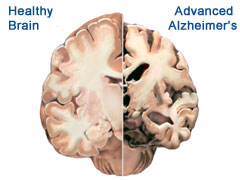Severe Alzheimer's Management Recommendations
Severe Alzheimer disease (AD) requires more frequent monitoring by health professionals than what currently exists, says a new report that provides this and other recommendations for the management of the later stages of the disease.
"The management of severe AD often presents difficult choices for clinicians and families," says Dr. Nathan Herrmann, lead author of the review and geriatric psychiatrist at Sunnybrook Health Sciences Centre. "Further research into the severe stages of AD and its treatment, are necessary in order to improve the care of patients and the quality of life for both patients and their caregivers."
The report, published in the December 2008 issue of the Canadian Medical Association Journal, is a literature review of over 800 articles studied, from which 17 recommendations were generated and outlines an evidence-based approach to the management of severe AD and for decision making in the care of the patient. "Our recommendations are made with the goal of enhancing quality of life for both the patient and caregiver," says Dr. Herrmann, also a Professor at the University of Toronto.
An overview of the recommendations:
- Assessment of severe AD should include the measurement of cognitive function and the assessment of behaviour, function, medical status, nutrition, safety and caregiver status.
- Treatment of neuropsychiatric symptoms begins with non-drug approaches to addressing behavioural problems.
- Potentially dangerous to the patient, caregiver and others, symptoms such as severe agitation, aggression and psychosis can be treated with atypical antipsychotic medications, with consideration of their increased risk of side effects which can include stroke and death.
- All medication approaches require careful monitoring and regular reassessment to determine whether continued treatment is necessary.
- Caregiver support and use of community resources are essential.
The paper also provides a case example of a man with severe stages of the disease and provides an overview of how the medical system and the patient’s family could best manage the approach to care.
Severe AD is characterized by a need for full-time care and assistance with basic activities of daily living, such as bathing, dressing and toileting. The progression of the illness varies, however the median survival period from its diagnosis is approximately six years, with about one-third of the time being spent in the severe stage. Because of their total dependence on others, patients with severe AD require much more caregiver time than those with milder dementia. The increased stress on the caregiver often leads to the need for institutional care for the patient.
PDF / View full media release »





